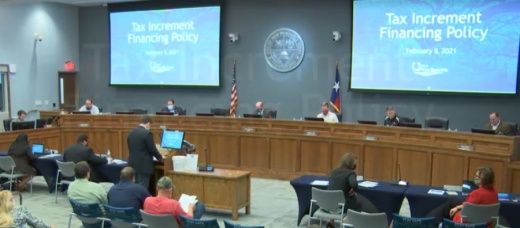As the city of New Braunfels continues its rapid growth, it is becoming increasingly important for officials to establish policy guidelines to help offset some of the possible negative impacts, according to city staff.
During the Feb. 8 City Council meeting, Jeff Jewell, economic development director for the city of New Braunfels, laid out initial plans to achieve that goal.
Jewell said tax increment financing, which in Texas is referred to as a tax increment reinvestment zone, or TIRZ, is a tool that helps offset the cost of needed public infrastructure to attract additional private investment.
“The designation usually requires the designation that an area is blighted, or underdeveloped, and that development would not take place but for the public expenditure of subsidy,” Jewell said.
A TIRZ can last for decades, and common uses focus on several factors, Jewell said, including funding extraordinary project costs, obtaining higher-quality development for a project and to achieve public policy goals.
In that spirit, Jewell told council it is important that the city establish a policy that helps officials mitigate some of the perceived negative impacts of tax increment financing—the diversion of tax revenue from needed services and the exacerbation of property value increases and gentrification.
“We think there are reasonable policy responses for this,” Jewell said.
With regard to policy the city should model, Jewell laid out several criteria.
Among other factors, TIRZ policy moving forward should focus on projects that are economically feasible, contribute to public policy goals, would not proceed without public assistance and that pay for themselves through generated revenue or justifiable community impacts, he said.
“We think that’s important because it really guards against oversubsidizing of projects,” he said. “You don’t want to give more funding to a project than it needs to achieve. You kind of want to find that Goldliocks principle.”
Next steps for the TIRZ policy include an eight-week timeframe for Jewell and his team to establish a solid policy proposal to send to council. That will include the creation of a finance committee and the involvement of other economic and community development stakeholders, Jewell said.
“Hopefully, right around the kickoff of river season is the [timeframe] we’re looking to give ourselves—right around 2 1/2 months,” he said, adding City Council should see a proposal around the beginning of summer.





